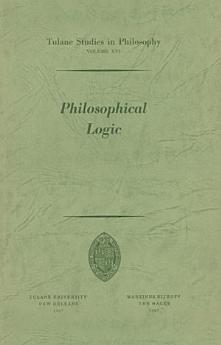Philosophical Logic
Robert L. Arrington · Peter M. Burkholder · Shannon Dubose · James W. Dye · James K. Feibleman · Bertrand P. Helm · Max Hocutt · Harold N. Lee · Louise N. Roberts · John C. Sallis · Donald H. Weiss
dhj 2012 · Tulane Studies in Philosophy Libri 16 · Springer Science & Business Media
Libër elektronik
162
Faqe
reportVlerësimet dhe komentet nuk janë të verifikuara Mëso më shumë
Rreth këtij libri elektronik
With this issue we initiate the policy of expanding the scope of Tulane Studies in Philosophy to include, in addition to the work of members of the department, contributions from philosophers who have earned advanced degrees from Tulane and who are now teaching in other colleges and universities. The Editor THE LOGIC OF OUR LANGUAGE ROBERT L. ARRINGTON Wittgenstein wrote in the Tractatus that "logic is not a body of doctrine, but a mirror-image of the world. " 1 In line with his suggestion that a proposition is a 'picture', Wittgenstein argued that propositions 'show' the logical structure of the real. He was insistent, however, that "the apparent logical form of a proposition need not be its real one. " 2 As a result of this we can misunderstand the structure of fact. Philosophical problems arise just when "the logic of our language is mis understood. " 3 It is common knowledge that much of this view of logic was rejected by Wittgenstein himself in the Philosophical Investi gations. There we are told that language has no ideal or sublime 4 logic which mirrors the structure of the extra-linguistic world. Consequently, inferences from the structure of language to the structure of that extra-linguistic world are invalid. Reality can be 'cut up' in any of a number of ways by language. Wittgenstein adopted a view of philosophy which would render that discipline a non-explanatory, non-critical study of the multiple ways in which language can be used.
Rreth autorit
Born in New Orleans, Louisiana, in 1904, James Feibleman is a prolific author who has published nearly 50 books of poetry, novels, autobiography, but mostly serious philosophy. He attended the University of Virginia for several years, but did not graduate. From 1925 to 1929, Feibleman was the assistant manager of a department store. He then resumed his education in Europe during the 1930s. During World War II, Feibleman was a professor of English at Tulane University, later becoming chair of the department of philosophy from 1952 to 1969. His major endeavor was formulating a system of philosophy that rested on the ontological foundations of realism harking back to Plato the idea that there is an a priori argument for existence but that incorporated modern science. The outline of Feibleman's system was expounded in his massive Ontology (1951) but was elaborated in a number of volumes in special areas such as aesthetics, ethics, political philosophy, and legal philosophy. Feibleman also published several books on popular philosophy. In addition to his active career in philosophy, Feibleman was a successful businessman. From 1930 until 1954, he was vice president and general manager of James K. Feibleman Realty Company. He was a major partner in the Leopold Investment Company (1954-1971).
Donald H. Weiss, Ph.D., is president of Self-Management Communications, Inc. and has been a training and development executive and consultant for more than 30 years. In addition to consulting work, he has held management positions with Citicorp, Millers Mutual Insurance, and Equitable. He has many books include the first two editions of Fair, Square & Legal, Why Didn't I Say That?, Secrets of the Wild Goose, and The Self-Management Workshop: A Trainer's Guide. He lives in the St. Louis area.
Vlerëso këtë libër elektronik
Na trego se çfarë mendon.
Informacione për leximin
Telefona inteligjentë dhe tabletë
Instalo aplikacionin "Librat e Google Play" për Android dhe iPad/iPhone. Ai sinkronizohet automatikisht me llogarinë tënde dhe të lejon të lexosh online dhe offline kudo që të ndodhesh.
Laptopë dhe kompjuterë
Mund të dëgjosh librat me audio të blerë në Google Play duke përdorur shfletuesin e uebit të kompjuterit.
Lexuesit elektronikë dhe pajisjet e tjera
Për të lexuar në pajisjet me bojë elektronike si p.sh. lexuesit e librave elektronikë Kobo, do të të duhet të shkarkosh një skedar dhe ta transferosh atë te pajisja jote. Ndiq udhëzimet e detajuara në Qendrën e ndihmës për të transferuar skedarët te lexuesit e mbështetur të librave elektronikë.







